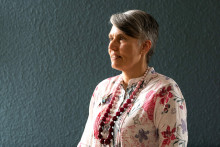Florence metz
Florence Metz is an Assistant Professor of Governance Resilience at the University of Twente. She has a background in political science and public policy and her research focuses on the policies that governments adopt and why they do so. She studies the politics of sustainability transitions by analyzing political actors and their interactions in policy processes.
Metz is one of the authors of the article ‘Why nations lead or lag in energy transitions’, which was published in the most recent edition of Science Magazine. It looks into how governments in Western democracies react to disrupted energy markets and why they adopt different strategies when it comes to energy transition.
Can you summarize the main goal of the Science article and the research it’s based on?
Metz: ‘The article published in Science is based on a longer article – part of a research project about the politics of climate change I have been involved in since 2018 after a research visit at Princeton. Together with other young scholars we wanted to see how countries respond to energy price shocks and why they respond so differently to the same problem. Countries vary in their political systems that enable transformational change in energy and climate policy.
We focused on two historical episodes illustrating variation in energy transitions across countries - the 1970’s oil shocks and policies to address climate change. The conflict in Ukraine created a comparable situation to the oil shock and raised a similar question: how do we move away from fossil fuels? And why do countries react so differently to the same shock? Because it was such a timely topic due to the current crisis, we decided to write the article for Science.’
How do different countries react and is it possible to say which ones respond to energy crises more appropriately?
‘Some countries see the disrupted energy markets as an opportunity to promote clean energy, while others double down on fossil fuel production. It’s fascinating to see, because almost the same happened in the 1970’s. Some countries invested in new energy technologies and continued the transition. For example, Denmark invested a lot in wind energy, while France focused on nuclear energy – policy which they are continuing to this day. A counter example is UK, which initially wanted to focus on nuclear energy but, after a new government came to power, this support was withdrawn. For the transition to work, policies need to be maintained over time. That is the only way for new technologies to develop, but not all governments can provide support. Ironically, some rich countries, such as the United States, have more difficulties to provide governmental support due to the nature of their political system.’
Can you elaborate on that?
‘The point we make in the article is: the success of energy transition has to do with the political system. Governments can pursue energy transitions through three different pathways: transition through insulation, meaning that politicians are insulated or shielded from the losers of the transition like businesses or consumers. The Netherlands has the prefect political system for this. Different parties take part in the government, which makes it hard for voters to know who to punish in the next election. The second way of transition is compensation, meaning that the government provides economic compensation, such as lowering taxes on gas. This is possible only in welfare states, though. The Dutch government, for example, can negotiate deals with businesses that ease the burden of the transition. The third way is market-based response, which is typical for the United States. Rather than deciding on policies that impose direct costs on businesses or consumers, new energy technologies are adopted when cheap enough –thus responding to market prices.’
What do you hope the impact of the article will be?
‘Firstly, I believe it shows that social science research is also important for energy transition. I hope the paper will encourage other social scientists to get involved in climate change research. Secondly, I hope it will help politicians to see how to make the most impactful policies. Having a systematic understanding of your country’s political system can help you see what you can achieve politically.’
What does this publication mean to you?
‘I’m a political scientist, so it is rather exceptional for me to have a publication in Science. I also learnt a lot during the process, because articles in Science are very condensed compared to other journals. I’m curious to see what reactions it will bring.
As a scientist, you often see that the long papers you put a lot of time and effort in, are not necessarily the things that attract attention. The pieces that are shorter and ‘out of the box’ generate the most attention, which can feel a bit disproportionate. For instance, Science Magazine awarded me as the overall winner of the 2015 Dance Your PhD Contest. The idea was for scholars to create a video in which they explain the topic of their PhD thesis through a dance performance. This led to a lot of media attention, which I really didn’t expect. Perhaps that is a lesson on how research results should be distributed and communicated.’







